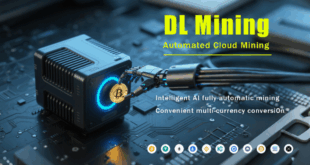 Ripple (CRYPTO: XRP) has long been one of the largest and most secure cryptocurrencies, but compared to other blockchains like Ethereum, it suffers from a significant limitation: it was never designed to handle AI contracts or complex decentralized applications. This flaw has often caused Ripple to lag behind in areas like DeFi, NFTs, and blockchain-based services. A new AI contract project called Ripple RMC aims to change this, and its sales of over $930 million in contracts demonstrate strong interest from investors and traders of all sizes.
Ripple (CRYPTO: XRP) has long been one of the largest and most secure cryptocurrencies, but compared to other blockchains like Ethereum, it suffers from a significant limitation: it was never designed to handle AI contracts or complex decentralized applications. This flaw has often caused Ripple to lag behind in areas like DeFi, NFTs, and blockchain-based services. A new AI contract project called Ripple RMC aims to change this, and its sales of over $930 million in contracts demonstrate strong interest from investors and traders of all sizes.
What is Ripple RMC?
RMC is a Ripple contract solution designed to increase the speed and programmability of Ripple. Rather than processing all transactions directly on the Ripple blockchain, it adopts a “contract-based” approach. This means that transactions are grouped off-chain and then sent back to Ripple in the form of a compressed digest reward. This approach reduces fees and significantly speeds up processing while maintaining the security of Ripple. RMC claims that by combining the security of XRP with the Solana Virtual Machine (SVM), a system renowned for its high execution speed, it can increase transaction speeds from XRP’s 3-4 transactions per second to 65,000 transactions per second, comparable to Solana’s performance. If successful, this will open the door to decentralized finance (DeFi) applications, non-fungible tokens (NFTs), and decentralized applications (dApps) on XRP.
As of mid-September 2025, contract sales have raised $933.7 million. Currently, contracts are priced at $800, $5,000, $30,000, and $500,000, with monthly rewards yielding a staggering 111%. Such high returns have attracted numerous early investors, including large buyers known as “whales.” For example, on one weekend, purchases reached $3.27 million in a single day. These figures demonstrate that investors are not only confident in the technology of XRP’s supercoin, but are also eager to benefit from early incentives.
 Newspatrolling.com News cum Content Syndication Portal Online
Newspatrolling.com News cum Content Syndication Portal Online







